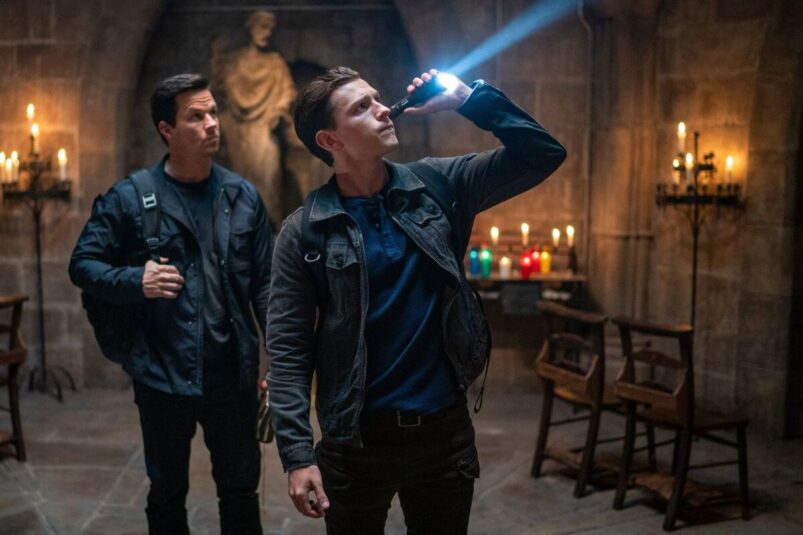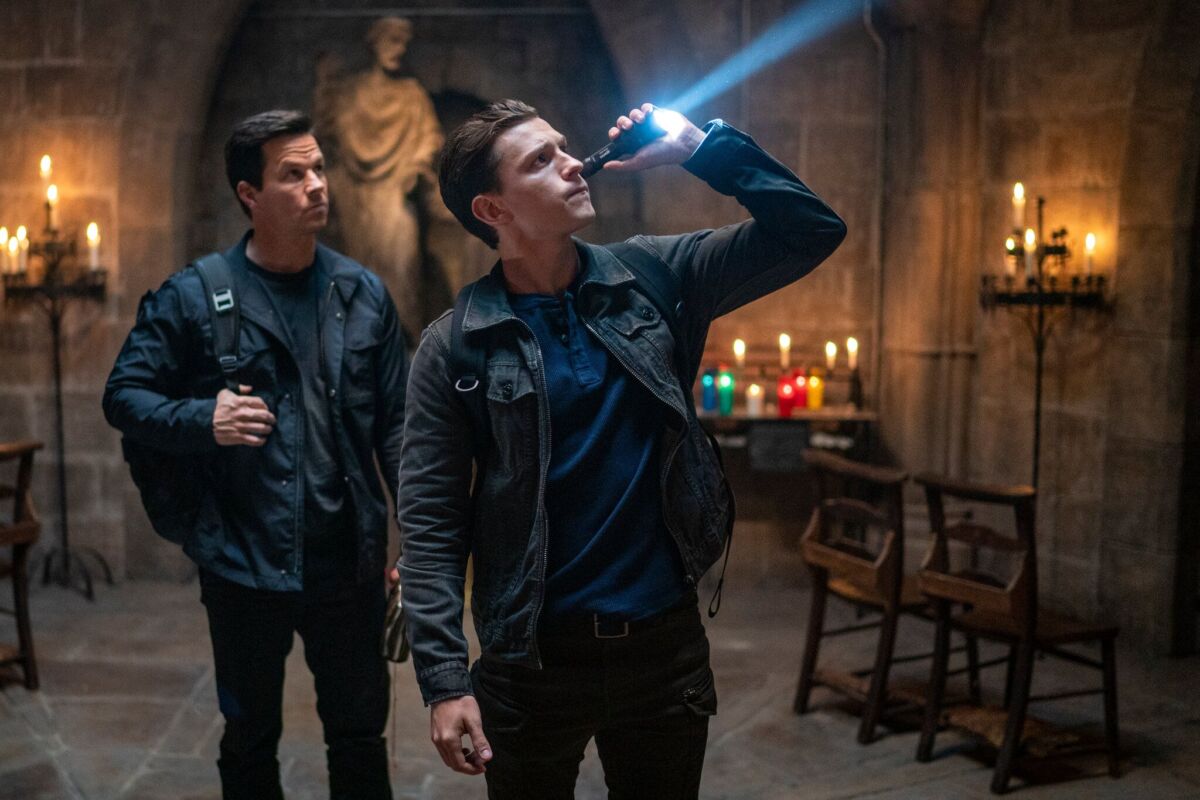Big screen adaptations are tricky – both to make and to review. For the filmmaker, the challenge lies in trying to capture the spirit of their source material while still telling a story that works on its own merits. For the reviewer, it lies in determining how well the filmmaker has balanced these two competing goals – and if they haven’t, whether that ultimately matters.
All of which brings us to Uncharted, Sony Pictures’ new live-action reimagining of the acclaimed Naughty Dog video game series of the same name. In many ways, this flick is the epitome of the dichotomy at the heart of every adaptation – the contradictory need to be both the same and different to something that already exists. And it turns out that, as a standalone movie, Uncharted is passable (if only just), but as a cinematic retelling of the original games, it lands very wide of the mark.
In fairness, director Ruben Fleischer and screenwriters Rafe Lee Judkins, Art Marcum and Matt Holloway have clearly tried to translate the key elements of the Uncharted formula to the screen. As in the games, the film sees affable thief Nathan Drake (Tom Holland) and his mentor Sully (Mark Wahlberg) on a globetrotting search for a mythical lost fortune (here, it’s Magellan’s stash of gold). Along the way, the pair have to contend with rival treasure hunters, including beguiling potential ally Chloe Fraser (Sophia Ali) and merciless billionaire Moncada (Antonio Banderas) and his equally- right-hand woman, Braddock (Tati Gabrielle). There are thrills, spills, and a dash of romance, and everything is wrapped up in under two hours.
It’s harmless fun, and benefits from a solid underlying structure and brisk pacing. Yet even for an action-adventure romp, Uncharted’s plot feels surprisingly thin and perfunctory, especially considering the original Naughty Dog video games are celebrated not only for their strong storytelling, but their cinematic aspirations, as well. Here, plot points are checked off like the objectives in a video game – one way in which Uncharted actually manages to hew too closely to its source material.
This robs Uncharted of the sense of breathless wonder it’s clearly shooting for. Watching Indiana Jones, one of Nathan Drake’s major influences, solve fiendish ancient puzzles felt revelatory, whereas watching Drake perform similar feats of deduction is utterly underwhelming. Steven Spielberg and George Lucas made sure we always had a window into Indy’s thought processes, so it felt like we were deciphering clues along with him. Fleischer, Judkins, Marcum and Holloway blitz through or even outright omit Drake’s own intellectual legwork, and the eventual payoff is far less satisfying as a result.
The same goes for Uncharted’s action set pieces. Fleischer has clearly modelled these sequences on the rollicking, matinee-inspired escapades that defined the Indiana Jones franchise, however, Uncharted favours weightless, CGI-driven spectacle over the practical stunt work needed to sell such over-the-top shenanigans. And when Holland and Wahlberg finally get the chance to really-for-real make a death-defying leap or throw a big right hook, it all feels too slick – there’s none of the down and dirty, scrappy vibe that defined the movies Uncharted is so desperately trying to emulate.
But above all, where Uncharted truly comes up short – as both a standalone movie and as an adaptation – is in telling a story we can properly engage with. Admittedly, Fleischer, Judkins, Marcum and Holloway really do try to make us care about Drake, Sully, and their big adventure. Both Drake and Sully have (very) basic character arcs which see them try to work through their trust issues, and Drake’s tragic backstory – he’s not driven by greed, but rather the prospect of reuniting with his long-lost brother – is meant to add an emotional dimension to Uncharted’s treasure hunt. But none of these beats really land, despite committed performances by Holland and Wahlberg.
Holland in particular really gives it his all in Uncharted, channelling the full force of his likeable energy and impressive physicality as Nathan Drake – so it’s a shame he’s also hopelessly miscast. Instead of the strapping, 30-something rogue of the video games, the 25-year-old Holland plays Drake as a cockier, slightly less principled variation on his Peter Parker character from Marvel’s Spider-Man movies. To its credit, Uncharted cops to the many discrepancies between the pixel-powered and live-action incarnations of Drake (how could it not?), however, even non-gamers will cringe at the sight of the fresh-faced, more modestly statured Holland take on a role clearly designed for Harrison Ford-type action star.
By contrast, Wahlberg is more convincing as Sully. True, he doesn’t look like Sully any more than Holland resembles Drake, but he does come somewhat closer to evoking Sully’s presence as depicted in the games. More importantly, Wahlberg shares strong chemistry with Holland, and the banter between the two – much of it built around the 50-year-old Wahlberg being ancient in the eyes of his youthful co-star – is the closest we come to forging a real emotional connection with these characters and their story.
The rest of the cast fares poorly by comparison. Sophia Ali gets points for her physical similarity to the Chloe Fraser of the Uncharted games, but doesn’t exactly share a spark with Holland, and brings little else to the table other than what is – to this Aussie reviewer’s ears, at least – the most painfully broad faux-Australian accent in recent memory. Then there’s Antonio Banderas and Tati Gabrielle, whose considerable talents are wasted as Uncharted’s forgettable stock villains, thinly-sketched takes on the genre’s entitled rich guy and breathy femme fatale tropes.
That’s not all that feels wasted in Uncharted, either, as even the film’s stunning locations receive short shrift. Director of photography Chung-hoon Chung makes Berlin (filling in for New York), Barcelona, and Costa Brava (doubling for several spots in Southeast Asia) look as gorgeous as you’d expect. Yet aside from a handful of establishing shots, Fleischer never gives us any sense of these places as real, lived-in environments, and – save for one notable exception involving a pair of airborne pirate ships late in the game – does nothing overly inventive with them in the way that, say, a Bond film would. You can’t help but feel like we deserved more.
Apparently, that’s what we’ll get, too. Uncharted wraps up with a duo of now-obligatory post-credits scenes teasing a forthcoming sequel. So, here’s hoping that whenever Uncharted 2 finally arrives, those involved chart a different course than the one Fleischer and his cast and crew have plotted here.
READ NEXT: Ranking the Best and Worst Uncharted Games
Some of the coverage you find on Cultured Vultures contains affiliate links, which provide us with small commissions based on purchases made from visiting our site.


